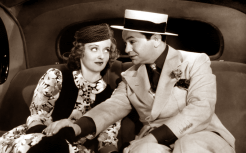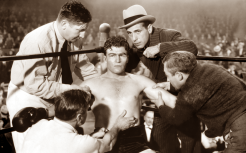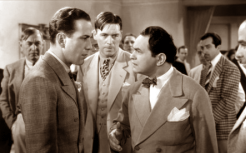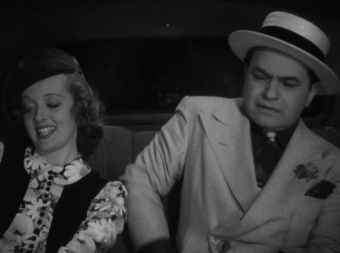




KID GALAHAD (1937)
| Producer: | Warner Brothers |
| Director: | Michael Curtiz |
| Story: | Francis Wallace |
| Screenplay: | Seton I. Miller |
| Cast: | Edward G. Robinson (Nick 'Nicky' Donati) |
| Bette Davis (Louise 'Fluff' Phillips) | |
| Humphrey Bogart (Turkey Morgan) | |
| Wayne Morris (Ward 'Kid Galahad' Guisenberry) | |
| Jane Bryan (Marie Donati) | |
| Harry Carey (Silver Jackson) | |
| William Haade (Chuck McGraw) | |
| Soledad Jimenez (Mrs. Donati) |
 Columnists had predicted Davis would turn down the part of Fluff in Kid Galahad,
fight-manager Robinson's mistress, who falls for the Kid but loses him to a younger
girl (Jane Bryan) and walks off into the fog alone. Davis surprised them by stating,
"Kid Galahad, while not giving me much of a role in the artistic sense, has such
a lot of good robust fight stuff in it that it is bound to appeal to a totally different
cinema audience, an audience with which I nevertheless need to be kept in touch."
Columnists had predicted Davis would turn down the part of Fluff in Kid Galahad,
fight-manager Robinson's mistress, who falls for the Kid but loses him to a younger
girl (Jane Bryan) and walks off into the fog alone. Davis surprised them by stating,
"Kid Galahad, while not giving me much of a role in the artistic sense, has such
a lot of good robust fight stuff in it that it is bound to appeal to a totally different
cinema audience, an audience with which I nevertheless need to be kept in touch."
As usual, Davis was right. Although her part was subordinate to the others, and the film concentrated on some unusually brutal boxing scenes, she gave her role such warmth and humor that she appeared to hold the story together. Her conciliatory scenes with the temperamental Robinson, her muted expressions of love for Morris, gave the character more depth than it deserved.
Bette Davis by Jerry Vermilye
In Kid Galahad, Robinson's Nick Donati has a problem with his sister (Jane Bryan). When a young fighter (Wayne Morris) whose career he's managing falls for his sister, Robinson bitterly turns against his protégé. Until the last moment, when he has a characteristic change of heart, he threatens to fix the big fight against his man. Nick's reaction is extreme; he's overly protective, having moved his mother and sister to the country in order to shield them from big city corruption. He thinks of women as being either virgins or whores, either pure (and therefore unable to contend with the world) or tough (like his mistress Fluff who can handle herself in a harsh, competitive man's world like the fight game).
Robinson is once again edged out at the end; he's killed in a locker-room shoot-out with a nasty rival manager (Humphrey Bogart). As in Barbary Coast, his removal clears the way for romance. With the sour, disapproving Robinson character out of the way, the young lovers are freed. But Robinson did not think of Nick as one of his anti-romantic roles. In an interview with Regina Crewe for New York American on May 23, 1937 Robinson said: "It has softer moments, the romantic element is strongly stressed.there is an odd sort of romance between Nick and Fluff but it is warm and sincere, nevertheless." It's true that he and Fluff have a mature understanding, but their real passion is directed elsewhere-Robinson's, toward protecting his sister's virginity, Davis', toward the unattainable Kid Galahad.
Under Curtiz' direction, Robinson's performance as the oddly obsessed manager is tart, but for once he doesn't quite dominate a film. As the kind-hearted mistress who falls for the Kid, and who smothers her feelings in honour of young love, Bette plays with a warmth that claims the movie as hers. Kid Galahad was designed as a Robinson movie, but it turns out instead to be an uncharacteristic Davis film.
Edward G. Robinson by Foster Hirsch
When Bette was rushed into another gangster picture, she quailed when she heard Curtiz would direct it but there was nothing she could do. She was consoled by a tight, fast-moving script and by the cast-not by Bogey again, but by Robinson and her beloved Jane Bryan (who played her kid sister in Marked Woman).
Already, in this second picture after her return (Warners had sued her for breach of contract), Bette had begun to assert a formidable degree of power. Irving Rapper, who later became director of two of her most famous pictures, Now, Voyager and Deception, recalls that Kid Galahad, on which he was dialogue director, offered his first chance to meet her. He says, "I asked the script girl, 'What's Bette Davis like?' and the girl rolled her eyes toward heaven. "Oh, God, don't ask me!' she replied." Now Rapper asked Michael Curtiz for his comment. "Son of a bitch, don't ask me," he also said. "You'll see her when she comes in."
Rapper's first sight of Davis was unforgettable: blue eyes wide, long neck stretched out, body thin and angular, she ran onto the set as though onto a tennis court, formidably geared for action. In the scene Robinson had to throw her bodily against a table. She struggled with him, then fell back. Curtiz screamed at her, "That's not the way to fight him, you goddamn bum!" And Bette screamed back, "You show me what you want me to do and I'll do it!" Curtiz, who had been a strongman in a circus, stood there while the tiny Robinson looked at him in terror. "It's okay, Eddie, throw me," Curtiz said. "But if you struggle," Robinson wailed, "that's the end of me!"
Bette had to laugh at the sight of the runtish actor trying to throw Curtiz's 195-pound body across the room. Everyone else broke up when Curtiz did a hilarious imitation of Bette, complete with swinging hips, snapped-out delivery, and frantically puffed cigarette. Robinson pushed him. Curtiz ricocheted off the table and almost knocked Robinson over. Then he said to Bette, "Goddamnit, bum, this is what I want!" She nodded and stood in position. Robinson pushed her with all the strength he had used on Curtiz. As a result, she ricocheted so violently that she flew clean across the set and into Irving Rapper's lap as he sat watching the scene. She screamed, "My God! Who are you?" He said, "I'm the dialogue director." And she replied, "Thank God you caught the ball!" And they burst out laughing and became good friends.
Bette, The Life of Bette Davis by Charles Higham
I guess I would be drawn and quartered if I passed Kid Galahad without telling you that its leading lady was Bette Davis. In any case, I may, of course, be drawn and quartered for what I'm about to say of her. Let me assure you, early on, that it is not what I had to say about Miriam Hopkins.
On the contrary. Miss Davis was and is every inch a lady-polite, mannerly, gracious, even self-effacing. But by today's standards she could never have gotten a job in a high school production of East Lynne. I know it's goatish of me to say it, but Miss Davis was, when I played with her, not a very gifted amateur and employed any number of jarring mannerisms that she used to form an image. In her early period Miss Davis played the image, and not herself, and certainly not the character provided by the author.
Though I cannot recall talking to her about this and thus having no personal knowledge of her feelings, I can only assume by reason of the difficulties she raised with Jack Warner that she was thoroughly aware of her problems. She was the victim of the movies' attitude toward women.
It was impossible for her to play a waif because there was too much steel in her; it was absurd for her to play a creature over whom men swooned because there was nothing about her to make you swoon. She was far too independent and self-assured to be a convincing whore, though she brilliantly played some unconvincing ones. The fact is she was not an ingénue or a comedienne or an inconstant wife when those were the roles reserved for actresses.
Had she remained on the stage (and she had had some minimal experience there), I think her development would have been quite extraordinary. She was not unlike Pauline Lord in her own way, or even, to make no odious comparison, like Sarah Bernhardt. The unpretty woman of the stage required meaty roles, deep in emotion, and filled with scenes of frustration and despair. Katharine Hepburn was in the same boat, but she was either luckier or more determined than Miss Davis; she also had more humour. She also had the fortune of finding Spencer Tracy as a co-star, and romance between them in the movies seemed not only plausible but welcome. She grew and grew, and wonderful parts opened for her.
Then, of course, the same thing happened to Miss Davis. It began early on, I think with Jezebel, and came to flower in All About Eve. She deserted the mannerisms, laying them aside, I should think, with unbounded joy.
Too late? For male actors it is possible, though not easy, to slip gradually from leading man into character roles. For me, it just came naturally, since I was never Tab Hunter; my unsymmetrical face grew more lined, and I was able to continue, the parts growing smaller, but the range (and, forgive me, the eminence) remaining. For a woman, it is extremely difficult. The day an actress agrees to play a mother is a turning point in her life. Where does she go from there? What does a pinup girl like Betty Grable do with the rest of her life? Or a Rita Hayworth?
But they were simply sex pots. Bette Davis never was. You know what I think? I think her best days are ahead of her. I think she'll give up those horror movies (that she played simply, I would guess, to make a living) and turn to the classics. To the Greeks and Ibsen and Lady MacBeth-to the classic parts where the role is ageless.
When I played with her in Kid Galahad, I did not admire Bette Davis; I admire her now.
All My Yesterdays, An Autobiography by Edward G. Robinson with Leonard Spigelgass
My new picture was Kid Galahad. It was a story about prizefighters and a good one. Mr. Curtiz was again my director and I will never forget Wayne`s knocking out a fighter in a take. "Fake fight! Retake! Fake fight-awful!" Curtiz screamed-but it was difficult to redo because Wayne's opponent was unconscious. He had knocked him out cold.
The Lonely Life by Bette Davis
For her next 1937 "post reconciliation" picture, Davis found herself co-starring for the first time with Edward G. Robinson. They were hardly a mutual admiration society, and their relations during Kid Galahad were professionally correct but cool. In his autobiography, Robinson indicated that he found Davis callow, overly dependent on mannerisms, and insufficiently trained in technique and projection. Davis in her autobiography made fun of Robinson, calling him a kind of male prima donna who protested to the director, during his final death scene, that Davis was doing too much weeping as she hovered over him. According to her, that was precisely the way the character would have behaved; according to him, she was overacting all over the place.
In later years, Robinson's attitude toward Davis had not mellowed, despite her vastly increased fame and many awards. In 1968 he told me: "I guess she improved later, especially after Wyler and Goulding put some discipline into her. But I always felt she had her distinct limitations." Davis's attitude toward Robinson, circa 1962, was: "He always had a high opinion of himself, and last time I met him he had just as inflated a self-estimate as ever!" Nonetheless they acted well together.
Inexplicably, Davis seemed to think well of Kid Galahad, though she has a knockabout role in a knockabout fight epic which, to be fair, Mike Curtiz directed for maximum excitement and melodramatic impact. She gave out interviews to the press in early 1937 that sounded suspiciously like rationalizations for her appearance in what was essentially just another Warner actioner. In some of the interviews, she went on about the necessity of acting a variety of parts to exhibit her range and claimed that Kid Galahad was one of those pictures that won her audiences she might not otherwise have reached. But the unspoken question by interviewers and fans alike was, were these the audiences she was after at that point in her career? Davis never did offer a satisfactory answer to that. Humphrey Bogart, who never got along with her but understood her struggles to get better film fare, opined later that she was probably putting a brave face on the matter, trying to come out as a good sport and a team player-real-life roles unsuitable to the Bette Davis everyone was on to by that time.
It is true that the role of Fluff is a sympathetic one, and that Davis has ample opportunity to demonstrate poignantly and winningly her "unrequited lover" persona. She also may have been trying to cover up in another respect, because she gave an interview to a fan mag in which she said that if she appeared particularly convincing in her love scenes, it did not mean that she was necessarily in love with her onscreen partners.
The interview cause snickers among those in the know, because it was obvious that Davis had developed a genuine temperature over handsome, muscular 23 year old Wayne Morris, who became a star after the release of Kid Galahad. Morris was perfect for the role, for he was a clean, decent kid off-screen who later became a WWII hero as a Navy aviator, earning four Distinguished Flying Crosses and two Air Medals. Discharged as a lieutenant commander, he went back to films but never recovered his initial flush of fame. In 1959, when he was just 45, he died of a heart attack while watching aerial manoeuvres from a carrier.
But in 1937 Wayne was at the top of the movie heap with Galahad and had his pick of eager young ladies, on and off the studio lot. "Bette really fell for him," her friend Jerry Asher remembered. "She was living her unrequited love off as well as on screen; it imparted a particular poignancy to her performance. Jack Warner always said Bette played love scenes best when she was actually in love, and she was overwhelmed by Wayne." Two things saved her, because he was obviously unaware of her feelings. First, she was 29 to his 23, and Wayne, as was well known, liked girls in their late teens or early 20s. Second, she was technically still a married woman (to first husband Ham Nelson), and fooling with other men's wives went against the young Wayne's code. Another factor was also a saving grace; when shooting was over they went on to other films. "And then the fact that she didn't have one kiss, not one clinch with him throughout Kid Galahad gave her no memories of what she was potentially missing," Jerry Asher laughed.
Kid Galahad was to be the subject of no less than two unfortunate remakes. One, The Wagons Roll at Night in 1941, (shown at our May seminar at Kempenfelt in 2009), had a circus rather than a boxing setting, with Bogart, this time as the Robinson character, Sylvia Sidney, Joan Leslie and Eddie Albert. The other, in 1962, inappropriately cast Elvis Presley as a singing fighter. Television retitled the 1937 picture The Battling Bellhop to avoid confusion with the indifferent but eventually more popular Presley version.
In the reviews, Davis got singled out occasionally, but usually found herself congratulated en masse with Robinson, Morris and the others. The New York Times nailed down Kid Galahad aptly enough with the words: "a good little picture-lively, suspenseful and positively echoing with the bone-bruising thud of right hooks to the jaw."
Fasten Your Seat Belts: The Passionate Life of Bette Davis by Lawrence J. Quirk
Notes compiled by Caren Feldman